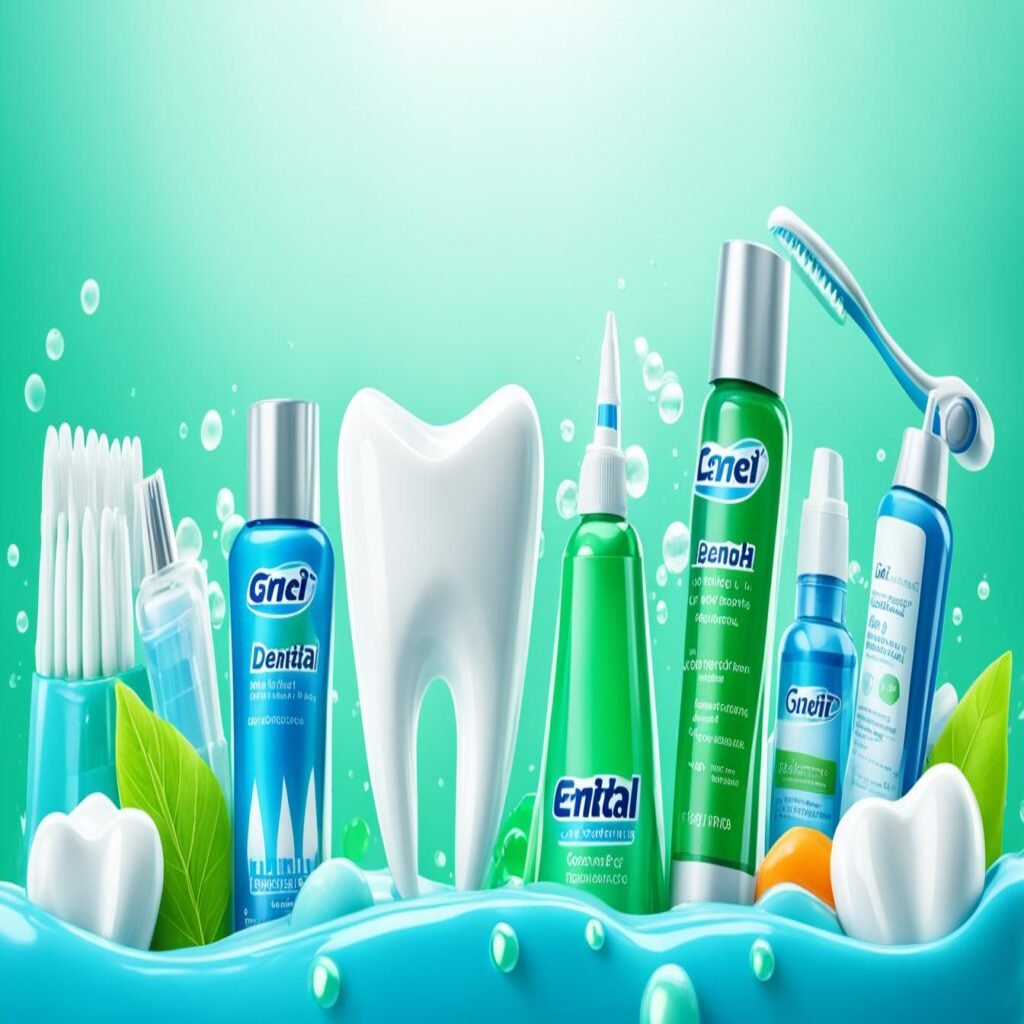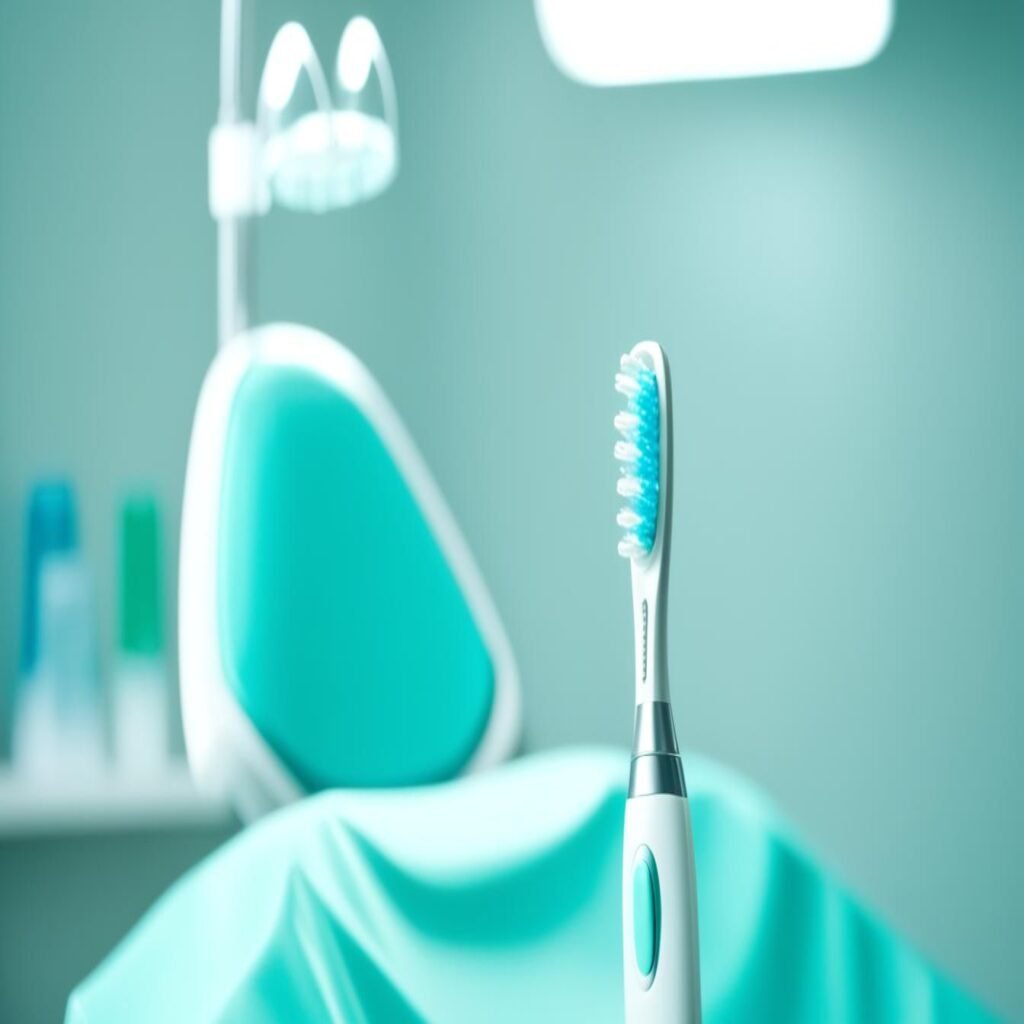Welcome to our guide on keeping your smile bright and your teeth healthy. To care for your teeth, it’s important to do more than just brush and floss. We’ll show you strategies and habits that lead to a sparkling grin and better health.
Table of Contents
ToggleKey Takeaways:
- Consistent tooth care routines are crucial for a healthy smile.
- Brushing and flossing daily prevents plaque and bacterial buildup.
- Choosing the right toothpaste and mouthwash supports optimal dental health.
- A nutritious diet contributes to strong teeth and gums.
- Scheduling regular dental check-ups and cleanings is essential.
The Importance of Daily Brushing and Flossing
It’s key to brush and floss every day to keep teeth and gums healthy. This daily routine helps keep teeth clean, strong, and without harmful build-up. By following this habit, you’re on your way to a healthier mouth.
Brushing daily is fundamental. It removes food bits and plaque from your teeth. This lowers your chances of getting cavities and gum issues. Remember to brush your teeth twice daily for two minutes each. Use a soft toothbrush and fluoride toothpaste. Brushing also makes your breath feel fresh and brightens your smile.
Flossing does what brushing can’t, cleaning between teeth and around gums. It’s a must for preventing oral issues. Make it a point to floss once daily. When you do, gently move the floss between each tooth, forming a “C.” This way, you cover all tooth surfaces.
“Daily brushing and flossing are like a dynamic duo when it comes to maintaining good oral hygiene. While brushing cleans the outer surfaces of your teeth, flossing reaches the areas that are inaccessible to a toothbrush. Together, they provide comprehensive cleaning and protection for your teeth and gums.”
Choosing the right products is also vital. Pick a toothbrush with soft bristles to avoid hurting your gums. For toothpaste, pick one with fluoride to keep enamel strong and protect against cavities.
Mouthwash can be a helpful addition too. It kills bad bacteria, freshens breath, and safeguards teeth and gums. Go for an alcohol-free mouthwash with germ-fighting features for best results.
Recommended Techniques for Brushing and Flossing:
- Hold your toothbrush at a 45-degree angle to your gums and brush in gentle, circular motions.
- Remember to brush the outer, inner, and chewing surfaces of your teeth.
- Pay extra attention to your back teeth, as they are often neglected.
- Use gentle pressure when flossing to avoid injuring your gums.
- Consider using floss picks or interdental brushes if traditional flossing is challenging.
By sticking to daily brushing and flossing, your teeth and smile will thank you. It’s an easy way to maintain good oral health.
Choosing the Right Toothpaste and Mouthwash
Not all toothpaste and mouthwash products are the same. It’s key to pick the right ones for your dental health. We’ll help you choose the best toothpaste and mouthwash for your teeth.
First, think about what your teeth need. If your teeth are sensitive, pick a toothpaste that helps. It should have ingredients like potassium nitrate or strontium chloride. These calm down sensitive teeth.
For those prone to cavities, fluoride toothpaste is a must. It makes your tooth enamel stronger and fights decay. Always choose a toothpaste with the ADA seal. That means it’s tested and works well.
“Not all toothpaste and mouthwash products are created equal. When it comes to maintaining optimal dental health, selecting the right products for your specific needs is crucial.”
If you want your teeth whiter, go for whitening toothpaste. These have ingredients like hydrogen peroxide or baking soda. But don’t overdo it. Too much can damage your enamel.
Mouthwash can do what brushing sometimes can’t. Choose one based on what you need. This could be fresh breath, less cavities, or cleaner teeth. For the best results, pick one without alcohol.

Remember, not all mouthwashes are for kids. Make sure the one you buy is safe for them. Again, look for the ADA seal on mouthwash to be sure it’s good for your family.
Knowing what your teeth need can make a big difference. By picking the right toothpaste and mouthwash, you’re taking a step towards a healthy, beautiful smile.
Maintaining a Nutritious Diet for Healthy Teeth
What you eat affects your dental health a lot. Eating healthy keeps your teeth strong and your smile bright.
There are certain foods that help your teeth stay healthy. Add these to your diet to avoid tooth decay and gum disease:
- Fresh fruits and vegetables: Foods like apples and carrots act as nature’s toothbrushes. They increase saliva and remove plaque.
- Calcium-rich foods: Dairy, leafy greens, and fortified non-dairy foods add vital calcium. This is key for strong teeth and bones.
- Lean proteins: Poultry, fish, and legumes are rich in phosphorus. This mineral, along with calcium, rebuilds and fortifies enamel.
- Water: Plain water keeps you hydrated and washes food particles and bacteria away. This lowers your chance of dental problems.
But, not all foods are good for your teeth. You should avoid some to keep your dental health in check:
- Sugary snacks and drinks: Too much sugar causes dangerous bacteria to grow. This leads to cavities. Pick fruits over sugary snacks.
- Carbonated drinks: These beverages can wear down your tooth enamel. Water, herbal teas, or milk are better options.
- Sticky and chewy foods: Munching on candies and dried fruits can lead to cavities. Clean your teeth after eating them.
- Acidic foods: Acidic items like citrus foods and tomatoes can weaken your enamel. Have them in moderation and rinse afterwards.
Eating the right foods and avoiding bad ones improves your dental health. Make sure to also practice good oral hygiene for a beautiful smile.
Remember, eating well is only part of dental health. Up next, we’ll talk about the necessity of regular visits to the dentist for the best oral care.
Regular Dental Check-Ups and Cleanings
Keeping your mouth healthy needs more than just brushing and flossing. You have to see your dentist for check-ups and cleanings too. Through these routine visits, any potential issues can be spotted early and your oral health stays in top shape.
During your dental check-ups, your dentist will carefully look at your teeth, gums, and mouth. They’re checking for any dental troubles like cavities, gum disease, or signs of oral cancer. Finding these issues early is the best way to stop them from getting worse. Your dentist might also take X-rays to get a full picture of your oral health.
Hygienists clean your teeth to get rid of plaque, tartar, and stains. These things can build up even if you brush and floss well. Professional cleanings reach spots you might miss, keeping your mouth free of bacteria and your breath fresh.
The Benefits of Preventive Dental Care
Regular check-ups and cleanings are key to a healthy smile. They offer several advantages:
- They catch dental problems early, which is crucial.
- Regular cleanings can stop gum disease, making your mouth healthier.
- They help maintain healthy teeth and gums, keeping your whole mouth in good shape.
- Your dentist can give you advice just for you, such as better ways to keep your teeth clean.
Remember, it’s much better to prevent dental issues than to treat them later. By making regular check-ups and cleanings a priority, you ensure your oral health remains great. This simple step can help preserve your beautiful smile for years to come.

| Dental Check-Ups | Cleanings |
|---|---|
| Comprehensive examination of your teeth, gums, and mouth | Thorough removal of plaque, tartar, and stains |
| X-rays and other diagnostic tests may be conducted | Polishing to remove surface stains |
| Early detection of dental problems | Prevention of gum disease |
| Personalized dental advice and recommendations | Fresher breath and a cleaner mouth |
Habits to Avoid for Better Tooth Care
To keep great tooth care, avoid bad habits. These habits can harm your teeth and hurt your oral health. By stopping these habits, you can keep your smile healthy.
Teeth Grinding
Grinding your teeth is bad. It can make your teeth hurt, cause jaw pain, and wear down your teeth. If you grind your teeth, try wearing a mouthguard. Also, learn to manage stress to stop the grinding.
Nail-Biting
Biting your nails is harmful to your health. It can chip or break your teeth. Try not to bite your nails. You can use stress balls or get help if you need to manage stress better.
Using Teeth as Tools
Don’t use your teeth to open things. It can break your teeth. Always use the right tools instead.
Snacking on Sugary Foods
Eating sugary snacks too often can hurt your teeth. Bacteria in sugar can damage tooth enamel. Eat healthier snacks like fruits, veggies, or cheese to keep your teeth healthy.
_”Avoiding these habits and adopting healthier alternatives can go a long way in protecting your teeth and maintaining optimal oral health.”_
Using a Hard-bristled Toothbrush
Using a hard toothbrush can harm your teeth and gums. Use a soft one and be gentle. It will clean your teeth without hurting them.
Forgetting to Replace Your Toothbrush
Change your toothbrush every three to four months. If it looks old, get a new one sooner. A new toothbrush cleans better and keeps your teeth healthy.
Smoking and Excessive Alcohol Consumption
Smoking and drinking too much are bad for your teeth. They can stain your teeth, make your gums sick, and cause cancer. Try to quit these habits. Getting help is a good idea.
Remember these bad habits to avoid for a healthy smile. Taking care of your teeth is important for your overall health.
Conclusion
To keep your smile healthy, follow the tips in this article. Brush and floss daily. And don’t skip your dental check-ups. These steps are key to your oral health.
Good dental care is not just for now; it’s for life. Stick with your oral hygiene routine. And see your dentist regularly. This will keep your smile bright and your teeth strong.
Looking after your teeth is an investment in your future. It stops dental problems and saves you money later. So, take care of your teeth. A healthy smile brings confidence and joy!
FAQ
What are some essential tooth care tips for maintaining a healthy smile?
Essential tooth care means brushing and flossing daily. Use fluoride toothpaste and eat a good diet. See your dentist for check-ups and cleanings often.
Why is daily brushing and flossing important for oral hygiene?
Brushing and flossing daily keep plaque off. This stops tooth decay, gum disease, and bad breath. Having a regular oral care routine is key.
How do I choose the right toothpaste and mouthwash for my specific dental needs?
Choose products based on what your teeth need. Go for fluoride for cavity-fighting. For a brighter smile, pick whitening toothpaste. Ask your dentist for the best choices.
How does a nutritious diet contribute to healthy teeth?
Eating right gives your teeth the calcium they need. This makes teeth strong and fights off decay. Stay away from sugary and acidic foods to protect your teeth from harm.
Why are regular dental check-ups and cleanings important?
Seeing your dentist often catches dental issues early, like cavities. Cleanings also remove tartar that brushing can’t.
What are some habits to avoid for better tooth care?
Avoid smoking, grinding your teeth, and chewing hard things. Also, don’t bite your nails. These habits can damage your teeth or wear down the enamel.

